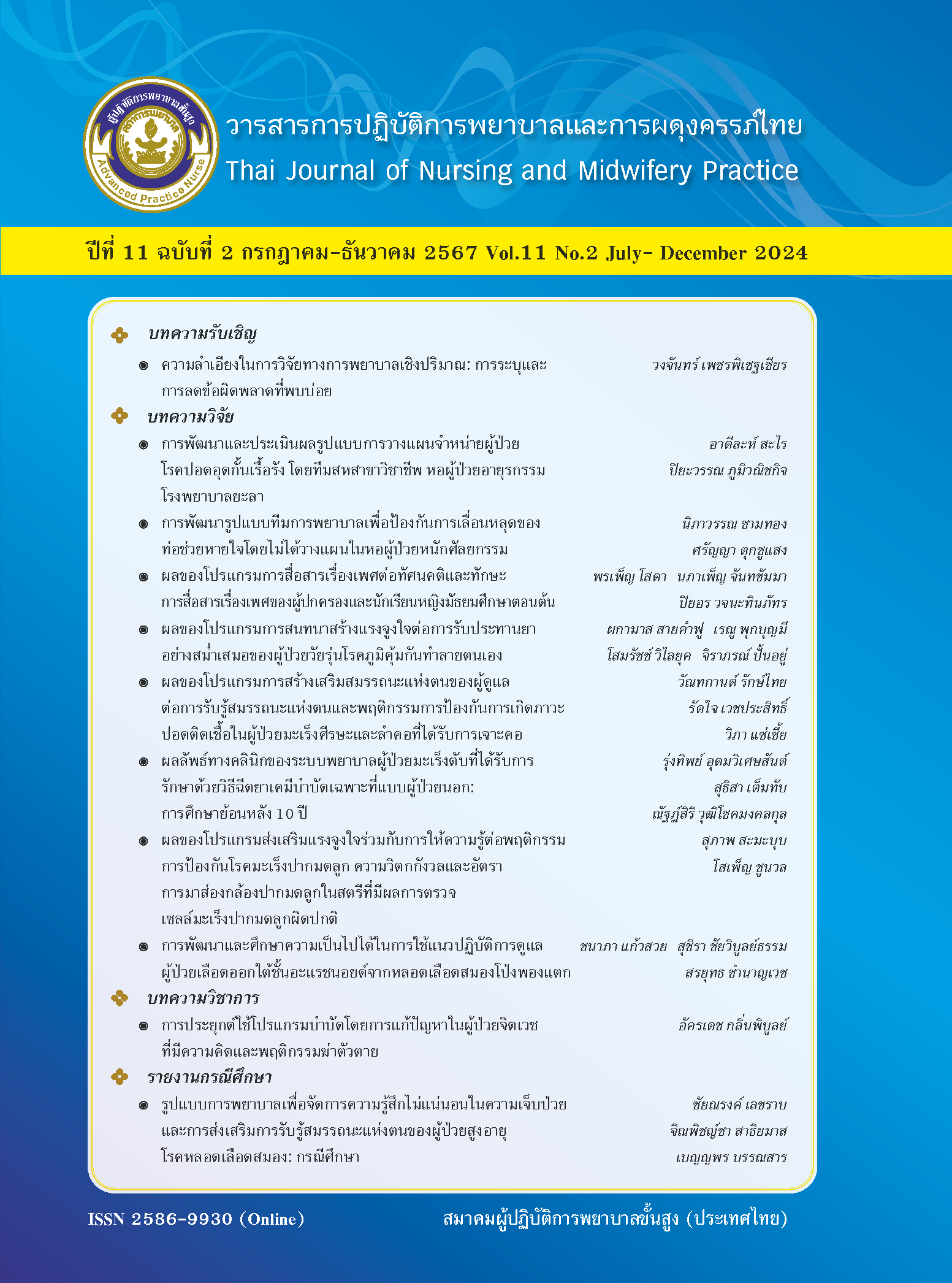A Nursing Model for Managing Uncertainty in Illness and Enhancing Self-Efficacy Among Older Adult Patients with Ischemic Stroke: A case study
Main Article Content
Abstract
Abstract: Older people experiencing their first stroke must cope with the issue of illness uncertainty, which has far-reaching consequences for both patient and family. The causes are often from a lack of understanding about the ailment, behavioral patterns, therapy choices, and determining the severity of affliction. This article presents an application of nursing model for managing uncertainty in illness combined with enhancing self-efficacy in a case study of geriatric stroke patients who had issues of health status perception and health behaviors which could delay post-illness rehabilitation. A self-efficacy framework was used as a guide which included verbal persuasion, viewing examples and experiences from others, assessing one's own successful experiences, and addressing physical and emotional environments throughout hospitalization phase. After application of this nursing model, it was shown to assist patients to set the goal for modifying health behaviors to prevent stroke recurrence with the engagement of family members. Patients were able to adopt appropriate health behaviors and felt confidence in self-care at home. This improves the patient’s quality of life and helps prevent stroke recurrence.
Downloads
Article Details

This work is licensed under a Creative Commons Attribution-NonCommercial-NoDerivatives 4.0 International License.
References
Collaborators GBDS. Global, regional, and national burden of stroke and its risk factors, 1990-2019: a systematic analysis for the Global Burden of Disease Study 2019. Lancet Neurol. 2021; 20(10): 795-820. doi: 10.1016/S1474-4422(21)00252-0.
World Stroke Organization. Up again after stroke [Internet]. 2022 [cited 2024 Mar 15]. Available from: http://www.world stroke campaign.org/.
Division of Non Communicable Disease Department of Disease Control. Stroke disease and sign of stroke [Internet]. 2022 [cited 2024 Apr 6]. Available from: http://thaincd.com/2016/media-detail. php?id=14331&tid=&gid=1-015-004.
Sansuk S, Phonmeesak J, Arrirak N, et al. The development of community health system to health care service system for stroke among elderly, Yasothon province. AJCPH. 2022; 8(4): 195-204. Thai.
Hirunkhro B. Care management model for elderly stroke patient at home. EAU Heritage. 2017; 11(3): 11-21. Thai.
Mamom J, Daovisan H. How buddhist religious care is incorporated for end-of-life stroke patients receiving palliative care at home during the COVID-19 pandemic: Revisiting constructivist grounded theory. Religions. 2020; 13(10): 1000. doi: 10.3390/rel13101000.
Mamom J, Daovisan H. Listening to caregivers’ voices: The informal family caregiver burden of caring for chronically ill bedridden elderly patients. Int J Environ Res Public Health. 2022; 19(1): 567. doi: 10.3390/ijerph19010567.
Mishel MH. Uncertainty in illness. J Nurs Scholarship.1988; 20(4): 225-32. doi: 10.1111/j.1547-5069.1988.tb00082.x.
Pimpava A, Leelahakul V, Toskulkao T. The uncertainty in illness of caregivers in ischemic stroke patients. CUTJ. 2016; 22(3): 329-39. Thai.
Arammuang S, Toskulkao T, Leelahakul V. The effects of information and emotional support program on uncertainty of illness and stress coping among caregivers of traumatic brain injury patients. Songklanagarind J Nurs. 2019; 39(3): 77-89. Thai.
Bandura A. Self-efficacy: The exercise of control. New York: W.H. Freeman; 1997.
Matchim Y, editors. Palliative care: Application of knowledge to practice. Pathum Thani: Thammasat University Press; 2022. Thai.
Alligood MR. Nursing theorists and their work. 10th ed. India; 2022.
Zhou Y, Zhou Y. Non-adaptive cognitive emotion regulation mediates the relationship between disease uncertainty and acute stress disorder in patients with ischaemic stroke. Front. Psychiatry. 2024; 15: 1319848. doi: 10.3389/fpsyt.2024.1319848.
Hancharoenkun S, Wongsunpharat B, Wonghongkul T. Factor inuencing uncertainty in illness among children with cancer receiving chemotherapy. TJN. 1991; 40(1): 11-26. Thai.
Hagen KB, Aas T, Lode K, et al. Illness uncertainty in breast cancer patients: validation of the 5-item short form of the mishel uncertainty in illness scale. Eur J Oncol Nurs. 2015; 19(2): 113-9.
Neurological Institute of Thailand. Clinical nursing practice guideline for stroke [Internet]. 2024 [cited 2024 June 28]. Available from: https://nit.go.th/cpg_cnpg
Jittanoon P, Buapetch A, Saksorngmuang P, et al. Cerebrovascular knowledge and preventive behaviors of cerebrovascular risk group: A case study of huinang sub-district, Trang province. Songklanagarind J Nurs. 2021; 41(2): 13-25. Thai.
Kongkaew O, Naka K, Kritpracha C. Illness representation and recurrence prevention behaviors in elderly with stroke. JRN-MHS. 2020; 40(1): 115-28. Thai.
Choengsa-ard N, Banglu W. Effectiveness of intermediate care for stroke patients through case management of Atsamat district health service network Roi Et province. Public Health Innov R&D. 2024; 5(1): 17-26. Thai.
Jandee G. Nursing care of patients with atrial fibrillation treated with warfarin: Case study. Academic Journal of Mahasarakham Provincial Public Health Office. 2020; 4(8): 244-65. Thai.
Ketvatimart M. The roles of professional nurses in the management of stroke patients. J Hlth Sci Res. 2017; 11(2): 71-80. Thai.
Faculty of Medicine Siriraj Hospital Mahidol University. Nutrition in the stroke patient [Internet]. 2017 [cited 2024 June 28]. Available from: https://www.si.mahidol.ac.th/th/healthdetail.asp?aid=1298
Pinkaeol T, Thiangthum W, Pichayapinyo P. The effects of the application of the health belief model and family support program on recurrence stroke prevention among first episode stroke survivors swelling in a rural community. NJPH. 2022; 32(3): 36-51. Thai.
Kunyodying T, Pothiban L, Khampolsiri T. Dependency of the elderly with stroke, caregiver burden, social support, and quality of life among older caregivers. TJN. 2015; 42(Supply): 107-17. Thai.
Piyahirun C, Kasiphol T, Prasertsong C. Effects of a self-efficacy promotion program for stroke caregivers. HCU Journal. 2018; 22(43-44): 130-42. Thai.
Wattradu D, Shanapa N, Tawongpea N, et al. Effects of health promotion program on self care knowledge, anxiety and behavioral change in stroke patients and caregivers. Thai J. Cardio-Thorac Nurs. 2010; 21(2): 18-33. Thai.
Jullamate P. Nurse care for older adult with stroke. 2nd ed. Faculty of Nursing, Burapha University; 2023. Thai.
Naklan S, Thongni M. Health status, health access and the quality of life in stroke patients in Muang district, Phetchabun province. J Hlth Sci Res. 2016; 10(1): 62-9. Thai.
Khumsa-ard S, Thiangtham W, Suwan-ampai P. Behavior factor related to recurrent stroke. J. Public Health Nursing. 2017; 31(Suppl): 13-26. Thai.


